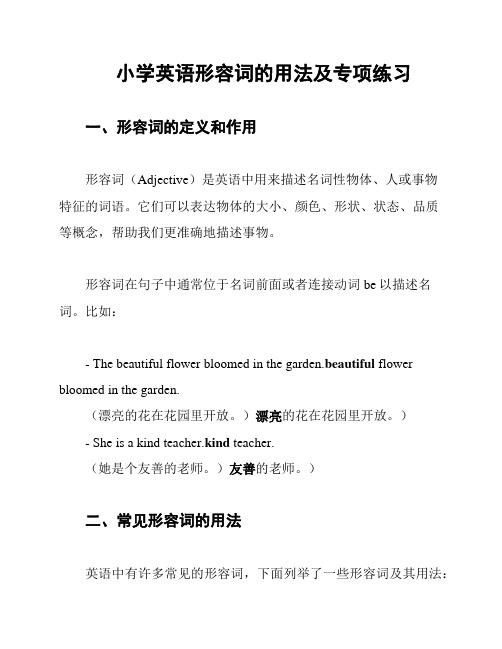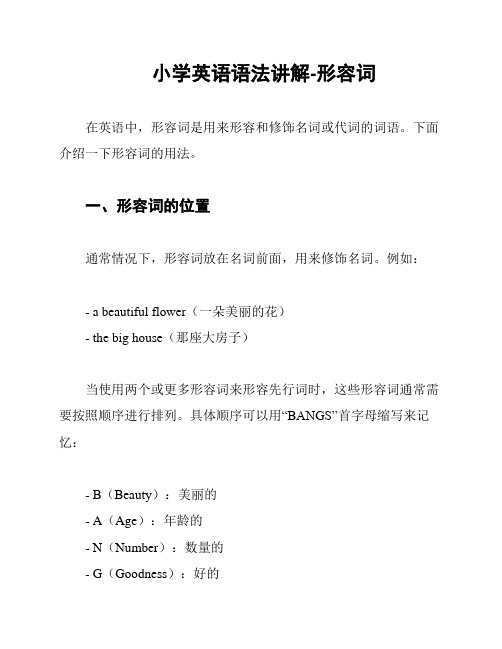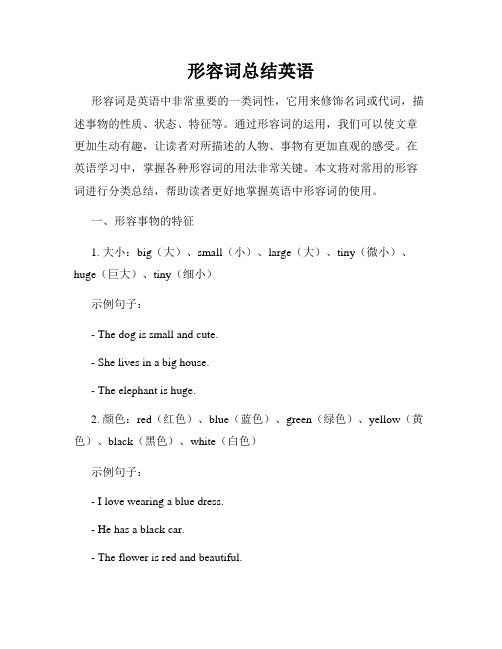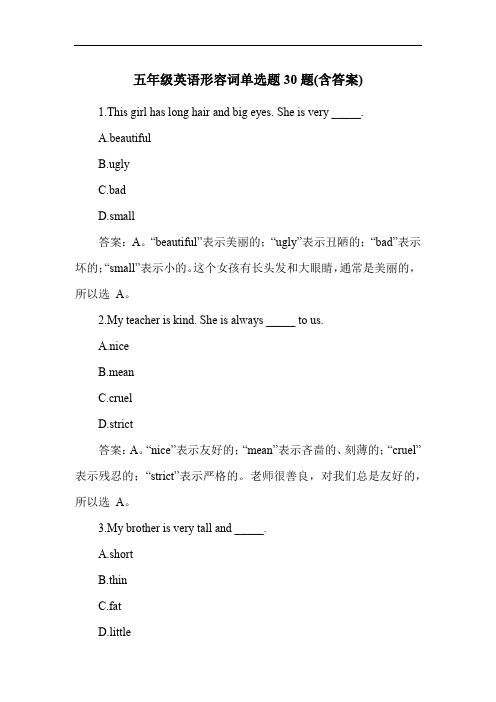小学英语形容词及相关问题
小学英语形容词的用法及专项练习

小学英语形容词的用法及专项练习一、形容词的定义和作用形容词(Adjective)是英语中用来描述名词性物体、人或事物特征的词语。
它们可以表达物体的大小、颜色、形状、状态、品质等概念,帮助我们更准确地描述事物。
形容词在句子中通常位于名词前面或者连接动词be以描述名词。
比如:- The beautiful flower bloomed in the garden.beautiful flower bloomed in the garden.(漂亮的花在花园里开放。
)漂亮的花在花园里开放。
)- She is a kind teacher.kind teacher.(她是个友善的老师。
)友善的老师。
)二、常见形容词的用法英语中有许多常见的形容词,下面列举了一些形容词及其用法:1. Big - 大的Big - 大的- a big house(一所大房子)big house(一所大房子)- a big tree(一棵大树)big tree(一棵大树)2. Small - 小的Small - 小的- a small dog(一只小狗)small dog(一只小狗)- a small pizza(一个小披萨)small pizza(一个小披萨)3. Tall - 高的Tall - 高的- a tall building(一座高楼)tall building(一座高楼)- a tall person(一个高个子)tall person(一个高个子)4. Short - 矮的Short - 矮的- a short pencil(一支短铅笔)short pencil(一支短铅笔)- a short boy(一个矮男孩)short boy(一个矮男孩)5. Happy - 开心的Happy - 开心的- a happy birthday(一个快乐的生日)happy birthday(一个快乐的生日)- a happy child(一个快乐的孩子)happy child(一个快乐的孩子)6. Sad - 悲伤的Sad - 悲伤的- a sad movie(一部悲伤的电影)sad movie(一部悲伤的电影)- a sad face(一张悲伤的脸)sad face(一张悲伤的脸)7. Beautiful - 美丽的Beautiful - 美丽的- a beautiful sunset(一个美丽的日落)beautiful sunset(一个美丽的日落)- a beautiful flower(一朵美丽的花)beautiful flower(一朵美丽的花)8. Ugly - 丑陋的Ugly - 丑陋的- an ugly sweater(一件丑陋的毛衣)ugly sweater(一件丑陋的毛衣)- an ugly monster(一个丑陋的怪物)ugly monster(一个丑陋的怪物)三、形容词的专项练请根据下列句子,选择合适的形容词填空:1. The little girl has a _______ puppy.- (A) big- (B) small- (C) tall- (D) short2. The _______ cat is sleeping on the chair.- (A) big- (B) small- (C) tall- (D) short3. I am very _______ today because it's my birthday! - (A) happy- (B) sad- (C) beautiful- (D) ugly4. She has a _______ smile on her face.- (A) big- (B) small- (C) happy- (D) sad5. The painting is _______ with vibrant colors. - (A) big- (B) beautiful- (C) ugly- (D) sad答案:1. (B) small2. (A) big3. (A) happy4. (C) happy5. (B) beautiful以上是关于小学英语形容词的用法及专项练习的内容,希望能帮助到你们!。
小学英语形容词知识点及练习题

小学英语形容词知识点及练习题学习时间:月日学生姓名:效果评价:一、本次知识点归纳:形容词用来修饰名词或代词,表示人或事物的性质、状态和特征。
它的位置通常放在被修饰的名词前,也可以放在be动词和look、feel、taste、sound、get之后。
二、重要知识点提示:比较级的句子结构通常是:ⅩⅩ +be 动词+ 形容词比较级 + than+ ⅩⅩ如: I'm taller than you. (我比你高。
)2.比较级变化规则:①一般在词尾加er tall-taller.②以字母e结尾,只加r. late-later③以辅音字母+y结尾,变y为i,再加er heavy-heavier④以一个元音字母和一个辅音字母结尾,双写末尾的辅音字母,再加er fat-fatter⑤不规则变化 good-better,bad / ill-worse,many / much -more,far-farther§如果比较的两者是一样的时候,我们会用 as…as…这个词组。
ⅩⅩ+ be + as + 形容词原形 + as + ⅩⅩ,表示“xx和xx一样……”其否定形式结构为:not+as+原级+as,表示“xx和xxx不一§三个或三个以上的人或物进行比较,用形容词最高级。
结构为:ⅩⅩ+ be + the + 形容词最高级+in/of等表示范围的短语,表示“最……”。
e.g. Autumn is the best season in New York. 形容词的最高级变化类似于比较级,只是把词尾的er改成est,如:tall (原形)- taller (比较级)- tallest (最高级)big ______ ______ small ______ ________ new ______ ________ tall ______ ______ short______ ________ old______ ________ weak ______ ______ strong ______ ______fat______ ________ hot ______ ______cold ______ ________ thin ______ ________二.用所给词的恰当形式填空。
小学英语(形容词)

▪ big /big/大的 ▪ small /smɔ:l/ 小的 ▪ long / lɔŋ/ 长的 ▪ tall /tɔ:l/ 高的 ▪ short /ʃɔ:t/ 短的 ▪ young /jʌŋ/ 年轻的 ▪ old /əuld/ 老的 ▪ strong /strɔŋ/ 强壮的 ▪ thin /θin/ 瘦削的 ▪ active /'æ ktiv/ 积极的 ▪ quiet /'kwaiət/安静的
▪ bigger更大的 ▪ heavier更重的 ▪ longer 更长的 ▪ thinner更瘦的 ▪ smaller更小的 ▪ good好的 ▪ better更好的 ▪ best 最好的 ▪ higher更高的 ▪ fine/fain/好的 ▪ great/greit/棒的
形容词
▪ heavy/'hevi/重的 ▪ new/nju:/新的 ▪ fat/fæ t/ 胖的
▪ how wide 多宽 ▪ how big多大 ▪ how large /hau lɑ:dʒ/ 面积多大 ▪ who /hu:/ 谁 ▪ whom 谁(宾格),疑问代词 ▪ when /wen/什么时候 ▪ whose /hu:z/ 谁的 ▪ where /wɛə/在哪里 ▪ why /wai/为什么 ▪ which /witʃ/ 哪一个
形容词
▪ ngry /'æ ŋgri/生气的 ▪ happy /'hæ pi/高兴的 ▪ bored /bɔrd/ 无聊的 ▪ sad /sæ d/难过的 ▪ taller更高的 ▪ shorter更短的 ▪ stronger更强壮的 ▪ older更老的 ▪ younger更年轻的
▪ right /rait/对的 ▪ hungry /'hʌŋgri/饿的 ▪ cute/kju:t/可爱的 ▪ little /'litl/小的 ▪ lovely/'lʌvli/可爱的 ▪ beautiful /'bju:təfəl/ 漂亮的 ▪ colourful /'kʌləful/ 五颜六色的
小学英语基础形容词

Clever(聪明的)
Stupid(愚蠢的)
Creative(有创造力的)
Dull(乏味的)
Polite(有礼貌的)
Rude(粗鲁的)
Patient(耐心的)
Impatient(不耐烦的)
2.形容词表示数量和大小(Quantitative and Size Adjectives):
Grungy(肮脏的,破旧的)
Well-groomed(打扮得整洁的)
1.形容词描述品质和特征(Descriptive Adjectives):
Good(好)
Bad(坏)
Beautiful(美丽)
Ugly(丑陋)
BriHale Waihona Puke ht(明亮)Dark(黑暗)
Kind(亲切的)
Generous(慷慨的)
Honest(诚实的)
Dishonest(不诚实的)
Friendly(友好的)
Subterranean(地下的)
Horizontal(水平的)
Vertical(垂直的)
5.形容词表示时间(Time Adjectives):
Early(早)
Late(晚)
Past(过去的)
Future(未来的)
Present(现在的)
Old(老)
Current(当前的)
Recent(最近的)
Ancient(古代的)
Near(近)
Far(远)
Above(在上面)
Below(在下面)
Left(左边)
Right(右边)
Nearby(附近的)
Distant(遥远的)
Over(在上方)
Under(在下方)
小学英语语法——形容词与副词知识点讲解+练习

形容词和副词一、形容词、副词概述1、形容词定义:形容词(adjective),简称adj,用来修饰名词或代词,表示人或事物的性质、状态和特征。
2、副词定义:副词(adverb),简称adv,用来修饰动词、形容词或副词,表示时间、频率、范围、语气、程度等。
二、形容词、副词考点纵览三、综合练习( ) 1. How beautifully she sings! I have never heard _____ voice.A. a betterB. a bestC. the betterD. the best ( ) 2. She looks very _____ but I can’t remember her name.A. similarB. familiarC. friendlyD. strange ( ) 3. Children all looked _____ at the broken model plane and felt quite _____.A. sad; sadB. sadly; sadlyC. sad; sadlyD. sadly; sad( ) 4. The child dreamed that he had once lived in a _______ house in the forest.A. wooden pretty littleB. little pretty woodenC. pretty little woodenD. wooden little pretty( ) 5. ---Which team is _______ to win the game?---I don’t know, but I’ve found _______ for ours to win.A. probable; it unlikelyB. likely; it possibleC. possible; it possibleD. likely; it possibly( ) 6. With the development of the Internet, _______ communication is done by regular mail.A. lessB. moreC. littleD. few( ) 7. ---If you don’t like the red coat, take the blue one.---OK, but do you have ______ size in blue? This one’s a bit tight for me.A. a bigB. a biggerC. the bigD. the bigger( ) 8. If there were no examinations, we should have ______ at school.A. the happiest timeB. a more happier timeC. much happiest timeD. a much happier time( ) 9. This dress is prettier, but it costs ______ that one.A. twice more thanB. twice as much asC. as much twice asD. twice so much as( ) 10.________students are required to take part in the boat race.A. Ten strong young ChineseB. Ten Chinese strong youngC. Chinese ten young strongD. Young strong ten Chinese( ) 11. Allen had to call a taxi because the box was ____to carry all the way home.A. much too heavyB. too much heavyC. heavy too muchD. too heavy much( ) 12. Our neighbor has ________ours.A. as a big house asB. as big a house asC. the same big house asD. a house the same big as( ) 13. We were in ________when we left that we forgot the airline tickets.A. a rush so anxiousB. a such anxious rushC. so an anxious rushD. such an anxious rush( ) 14. ---I was riding along the street and all of a sudden, a car cut in and knocked me down.---You can never be ________careful in the street.A. muchB. veryC. soD. too( ) 15. ---You don’t look very ________.Are you ill?---No,I’m just a bit tired.A. goodB. wellC. strongD. healthy( ) 16. Four of Robert’s children were at the party,including ________, Luke.A. the eldestB. an oldest oneC. the oldD. an old one( ) 17. Many students signed up for the ________race in the sports meeting to be held next week.A. 800-metre-longB. 800-metres-longC. 800 metre lengthD. 800 metres length( ) 18. It’s always difficult being in a foreign country,________if you don’t speak the language.A. extremelyB. naturallyC. basicallyD. especially( ) 19. In recent years,travel companies have succeeded in selling us the idea that the further we go,__________.A. our holiday will be betterB. our holiday will be the betterC. the better our holiday will beD. the better will our holiday be( ) 20. When he heard a cry for help, he ran out as ________ as he could.A. hardlyB. quicklyC. finallyD. slowly( ) 21. “Our team is _____ to win the match.” “Really? But I don’t think so.”A. easyB. difficultC. possibleD. sure( ) 22. A ______ road goes ______ from one place to another.A. straight; straightB. straightly; straightlyC. straight; straightlyD. straightly; straight( ) 23. “This book is ______ more useful for us students.” “Yes, but it is _______ too difficult.”A. quite; quiteB. much; ratherC. rather; quite D quite; much( ) 24. There was a ______ change in the weather, and the rain came pouring down.A. quickB. slowC. fastD. sudden( ) 25. You can speak ______ in front of him, but you can’t eat ______ in his restaurant.A. freely; freelyB. free; freelyC. freely; freeD. free; free( ) 26. Tom will not be at the picnic, ______ to the family’s disappointment.A. muchB. moreC. too muchD. much more( ) 27. --- I have seen so little of Mike ______. Is he away on business?--- Oh, no. He just leaves for his office early and comes back very ______.A. later; latelyB. later; laterC. lately; lateD. late; lately( ) 28. From his ______ voice on the phone I know everything is well under way.A. satisfactoryB. satisfyingC. satisfiedD. satisfaction( ) 29. In ______ Chinese culture, marriage decisions were often made by parents for their children.A. traditionalB. historicC. peacefulD. civil( ) 30. The houses in the village are ______ built of wood and hay.A. mostB. almostC. nearlyD. mostly( ) 31. --- What do people wear when they go to the theatre?--- Well, it isn’t very ______. People can wear anything they like.A. normalB. certainC. modernD. simple( ) 32. Mary’s biology is ______ than ______ in the class.A. a lot of better; anyone else’sB. far better; anyone’s else’sC. much better; anyone elseD. a lot better; anyone else’s( ) 33. We decided not to climb the mountains because it was raining ____.A. badlyB. hardlyC. stronglyD. heavily( ) 34. Paris is one of _____ cities in the world.A. more beautifullyB. more beautifulC. the most beautifullyD. the most beautiful ( ) 35. Are you going to leave______?A. the open windowsB. the windows openingC. the windows openD. the windows opened( ) 36. Bob never does his homework _____ Mary, so he makes lots of mistakes.A. so careful asB. as carefully asC. carefully asD. as careful as.( ) 37. My sister is good at sports. She can jump ____ than me.A. highestB. very highC. too highD. much higher ( ) 38. When spring comes, the trees get ____.A. green and greenB. green and greenerC. greener and greenD. greener and greener( ) 39.He works very ___________.He _____________has a rest on Sundays.A. hard; hardlyB. hardly; hardC. hard; hardD. hardly; hardly( ) 40.He learns Russian_____________.A. goodB. niceC. wellD. fine( ) 41.The boy didn’t run______________ to catch the bus.A. fast enoughB. enough fastC. quick enoughD. enough quickly ( ) 42.Eating _____________ is bad for our health.A. much tooB. too muchC. too moreD. too many( ) 43.Have you ever seen ______________ big panda before?A. a suchB. such aC. so aD. as( ) 44.He looks very _____________ today.A. worriedB. worryC. worryingD. to worry( ) 45.Listen to me. I have _____________ to tell you.A. important somethingB. important anythingC. something importantD. anything important( ) 46. ---How ___ can you finish the drawing?--- In ten minutes.A. longB. often.C. soonD. rapid( ) 47. This book is _____ worth seeing again.A. veryB. quiteC. wellD. much( ) 48. My _____ brother is three years ____ than I .A. old; olderB. elder; olderC. older; elderD. old; elder( ) 49. We felt ___ after we watched the ___ football match.A. exciting; excitedB. excited; excitingC. excited; excitedD. exciting; exciting( ) 50. The old man lived ____ in the house, but he didn’t feel___.A. lonely; lonelyB. alone; lonelyC. alone; aloneD. lonely; alone小学英语语法——形容词与副词知识点讲解+练习参考答案1. A2.B3.D4.C5.B6.A7.B8.D9.B 10.A 11. A 12.B 13.D 14.D 15.B 16.A 17.A 18.D 19.C 20.B 21. D 22.A 23.B 24.D 25.C 26.A 27.C 28.C 29.A 30.D 31. B 32.D 33.D 34.D 35.C 36.B 37.D 38.D 39.A 40.C 41. A 42.B 43.B 44.A 45.C 46.C 47.C 48.B 49.B 50.B11。
小学英语语法讲解-形容词

小学英语语法讲解-形容词在英语中,形容词是用来形容和修饰名词或代词的词语。
下面介绍一下形容词的用法。
一、形容词的位置通常情况下,形容词放在名词前面,用来修饰名词。
例如:- a beautiful flower(一朵美丽的花)- the big house(那座大房子)当使用两个或更多形容词来形容先行词时,这些形容词通常需要按照顺序进行排列。
具体顺序可以用“BANGS”首字母缩写来记忆:- B(Beauty):美丽的- A(Age):年龄的- N(Number):数量的- G(Goodness):好的- S(Size):大小的例如,正确的顺序为:a beautiful old Chinese bowl(一只美丽的、古老的、中国式的碗)二、形容词的比较级和最高级形容词有比较级和最高级两种形式。
用来表示两个事物之间的比较,可以使用比较级,常用的比较级形式有“-er”和“more + 形容词”。
如:- My sister is taller than I am.(我姐姐比我高。
)- The water is more blue than green.(水的颜色更蓝。
)用来表示三个或三个以上事物之间的比较,可以使用最高级,常用的最高级形式有“-est”和“most + 形容词”。
如:- She is the tallest student in the class.(她是班上最高的学生。
)- The black cat is the most popular one in the pet store.(黑猫是宠物店里最受欢迎的。
)三、形容词的否定形式在英语中,当需要否定形容词时,可以在形容词前面加上“not”。
如:- Jim is not tall.(吉姆不高。
)四、形容词的所有格形式当形容词用于表示某人或某物的所有格时,通常需要加上一个“-’s”。
如:- The girl’s hair is beautiful.(女孩儿的头发很漂亮。
形容词总结英语

形容词总结英语形容词是英语中非常重要的一类词性,它用来修饰名词或代词,描述事物的性质、状态、特征等。
通过形容词的运用,我们可以使文章更加生动有趣,让读者对所描述的人物、事物有更加直观的感受。
在英语学习中,掌握各种形容词的用法非常关键。
本文将对常用的形容词进行分类总结,帮助读者更好地掌握英语中形容词的使用。
一、形容事物的特征1. 大小:big(大)、small(小)、large(大)、tiny(微小)、huge(巨大)、tiny(细小)示例句子:- The dog is small and cute.- She lives in a big house.- The elephant is huge.2. 颜色:red(红色)、blue(蓝色)、green(绿色)、yellow(黄色)、black(黑色)、white(白色)示例句子:- I love wearing a blue dress.- He has a black car.- The flower is red and beautiful.3. 形状:round(圆形)、square(正方形)、triangular(三角形)、oval(椭圆形)示例句子:- She has a round face.- The table is square.- The bottle has an oval shape.4. 材质:wooden(木制的)、metal(金属的)、plastic(塑料的)、glass(玻璃的)示例句子:- I bought a wooden chair.- The cup is made of glass.5. 质量:good(好的)、excellent(优秀的)、poor(差的)、great(很棒的)、terrible(糟糕的)示例句子:- She is an excellent singer.- The food at that restaurant is good.二、形容人的特征1. 年龄:young(年轻的)、old(年老的)、elderly(年长的)示例句子:- My grandmother is old, but she is still very active.- He looks younger than his actual age.2. 外貌:beautiful(美丽的)、handsome(英俊的)、ugly(丑陋的)、attractive(有魅力的)示例句子:- She is a beautiful girl with long hair.- He is a handsome man with a charming smile.3. 聪明程度:intelligent(聪明的)、smart(机灵的)、stupid(愚蠢的)、brilliant(才华横溢的)示例句子:- She is an intelligent student and always gets good grades.- He is a brilliant scientist.4. 身体状况:healthy(健康的)、sick(生病的)、fit(健康的)、weak(虚弱的)示例句子:- I try to eat healthy food and exercise regularly.- He is sick and needs to see a doctor.5. 性格:kind(善良的)、friendly(友好的)、mean(刻薄的)、generous(慷慨的)示例句子:- She is a kind and caring person.- He is a generous man who always helps others.三、形容情感和心理状态1. 快乐:happy(快乐的)、joyful(欢乐的)、excited(兴奋的)、delighted(高兴的)示例句子:- I feel happy when I spend time with my friends.- She was delighted to hear the good news.2. 悲伤:sad(伤心的)、gloomy(阴郁的)、depressed(沮丧的)、miserable(痛苦的)示例句子:- He felt sad after watching a sad movie.- She has been feeling depressed since she lost her job.3. 兴奋:excited(兴奋的)、thrilled(激动的)、eager(渴望的)、enthusiastic(热情的)示例句子:- They were excited to go on a trip.- I am eager to start my new job.4. 紧张:nervous(紧张的)、anxious(焦虑的)、worried(担心的)、stressed(压力大的)示例句子:- She was nervous before her presentation.- He is stressed about his upcoming exams.5. 满意:satisfied(满意的)、content(满意的)、pleased(高兴的)、happy(开心的)示例句子:- He felt satisfied with his performance in the competition.- She was pleased with the outcome of the project.总结:形容词在英语中扮演着非常重要的角色,通过形容词的使用,我们可以更加生动地描述事物的特征、人的品质和情感状态。
小学英语英语形容词辨析训练及解析含解析

小学英语英语形容词辨析训练及解析含解析一、选择题1.— What language is that guy speaking? I can hardly catch a __________ word!—Neither can I. He’s from India. So I guess it’s Hindi.A.silent B.single C.simple D.similar2.As the population ________, the world seems to be smaller.A.increases more B.increase larger C.grows larger D.grows more 3.—How do you feel about the dish?—Look! This is nothing but ________ vegetable soup.A.famous B.wonderful C.unusual D.common4.I like collecting old stamps because they are ________.A.simple B.valuable C.impossible D.natural5.—How do you like the talk show?—I think it's ________, but some people think it's so ________.A.wonderful enough; bored B.enough wonderful; boringC.wonderful enough; boring D.enough wonderful; bored6.The basketball match will be covered _______ on TV tonight.A.lively B.live C.living D.alive7.The Spring Festival is one of the ______ festivals in China and everyone loves to celebrate it. A.modern B.traditional C.international D.ancient8.It’s _________ knowledge t hat bad moods can have an influence on our health.A.unusual B.special C.general D.common9.I think “heroes in harm’s way(逆行者)” must be one of the ________words on the Internet last year.A.hottest B.widest C.cleverest D.driest10.My little sister is ________ and she always asks me different kinds of strange questions. A.creative B.wise C.curious D.generous 11.This kind of drink tastes ________ but there’s only ________ in this bottle. I’d like some more.A.good;a little B.well;a little C.good;little D.well;little12.It's very ________ for teenagers to feel a little bit worried and stressed because most of us have such feelings.A.common B.strange C.curious D.energetic13.He takes part in all kinds of activities in his _____ time.A.busy B.spare C.high D.empty 14.—Peter has good grades in all his subjects, but he never shows off.—I agree. He is very________.A.humorous B.organized C.modest D.generous15.— What do you think of those doctors in Wuhan, Ma Lin?—How brave they are! They’ve tried their best to ke ep patients ________.A.live B.alive C.living D.lively16.—I really can’t believe such a learned man has made so silly a mistake.—Don’t you know _______ sense is worth more than knowledge.A.general B.usual C.special D.common 17.Don’t be angry with your monitor, Tom. He’s just a little ________, but in fact he’s kind to us each.A.polite B.brave C.modest D.strict18.—It’s a(n)__________ report. You must read it.— Oh, yes. It says our school won the basketball final.A.excited B.exciting C.bored D.boring 19.—Dad, I've tried my best but I still can't solve these problems.—Don't worry, my son. No one is ________ and everyone fails from time to time. A.successful B.confident C.perfect D.excellent 20.—Wow, Parasite (寄生虫) won the Oscar for Best Picture this year.—I was really _________ when I heard about it, because it is the first time that an Asian film won the award.A.surprised B.lucky C.confident D.sure21.—You haven’t said a ________ word since last Friday. What’s wrong?—Nothing. Just let me alone.A.simple B.single C.similar D.silent 22.—We’re late! It’s already 7:30.—Don’t worry. My clock is 20 minutes ________.A.fast B.late C.slow D.early23.It’s ________ knowledge that moods can have an influence on our health.A.unusual B.special C.general D.common24.—I can’t afford the red shoes.—What about the black pair? The price is a little ________.A.cheaper B.lower C.higher D.more expensive 25.Sadly the number of the tigers is getting ________.A.more and more B.fewer and fewer C.smaller and smaller D.less and less 26.Although this may sound like a ________ process, great care is needed.A.stupid B.similar C.simple D.strict27.—How was your exam the day before yesterday?—Well, I feel quite good. I made ________ mistakes than before.A.fewer B.the fewest C.less D.the least28.— I got a job in a sales company.—Great! Make yourself ________ so that they don’t want to lose you.A.valuable B.possible C.enjoyable D.comfortable 29.Millie used to be ________, but now she can make friends with others and organize activities. A.shy B.active C.honest D.lively30.—Henry, you seem ________ than before. What are you doing these days?—Well, I am preparing for the coming examination.A.busier B.happier C.lazier D.healthier 31.Yesterday’s film was really ________ and it m ade all of us laugh.A.boring B.funny C.meaningless D.expensive 32.There’s a ________ feeling that a high price means good quality.A.sudden B.joyful C.hard D.general 33.With true friends, we feel ________ to share our joy and sadness to the greatest possible degree.A.free B.suitable C.strange D.friendly 34.—What do you think of the film Hi, Mom directed by Jia Ling?—I have never seen a ________ one before. I can’t wait to see it again.A.best B.worse C.better D.worst35.Our monitor Jenny is so ________ that she always keeps things in good order. A.organized B.practical C.generous D.modest36.— I wish I could move away from the noisy city.— Really? But I think the life in the countryside may be .A.comfortable B.boring C.peaceful D.exciting37.It is ________ for people to drive after drinking or without wearing a seat belt.A.sick B.dangerous C.funny D.important 38.—It is a ________ choice to decide whether take on a new challenge or remain the same.—Yeah, I just have difficulty making the decision.A.simple B.straight C.double D.typical39.—It will be ________.—That’s great! The whole world will be white.A.sunny B.cloudy C.snowy D.foggy40.My little cousin is a(n) ________ boy and he always comes up with new ideas for class activities.A.creative B.curious C.organized D.energetic【参考答案】一、选择题1.B解析:B【详解】句意:——那家伙在说什么语言?我几乎一个字也听不清!——我也不会。
五年级英语多个形容词排序单选题40题(含答案)

五年级英语多个形容词排序单选题40题(含答案)1.She is a _____ girl.A.beautiful long black-hairedB.long beautiful black-hairedC.beautiful black-haired longD.long black-haired beautiful答案:B。
多个形容词修饰名词时,其顺序为:限定词(冠词、指示代词、不定代词等)、数词、描绘性形容词((beautiful 等)、大小长短高低等形容词((long 等)、形状形容词、年龄新旧形容词、颜色形容词、国籍形容词、材料形容词等。
A 选项顺序错误,C 选项long 位置不对,D 选项顺序混乱。
2.He has a _____ face.A.round small cuteB.small round cuteC.cute small roundD.small cute round答案:B。
根据形容词排序规则,small 表示大小,round 表示形状,cute 是描绘性形容词,所以顺序为small round cute。
A 选项顺序错误,C 选项顺序不对,D 选项顺序有误。
3.The boy has _____ eyes.A.big blue shinyB.blue big shinyC.shiny big blueD.big shiny blue答案:A。
big 表示大小,blue 是颜色,shiny 是描绘性形容词,顺序为big blue shiny。
B 选项错误,C 选项不对,D 选项顺序错误。
4.She is wearing a _____ dress.A.long red silkB.red long silkC.silk long redD.red silk long答案:A。
long 表示长短,red 是颜色,silk 是材料,顺序为long red silk。
B 选项错误,C 选项不对,D 选项顺序错误。
小学英语形容词

小学英语形容词在小学英语的学习中,形容词是一个非常重要的部分。
形容词就像是给事物穿上了一件彩色的衣服,让它们变得更加生动、具体和有趣。
那么,什么是形容词呢?形容词就是用来描述或修饰名词或代词的词汇,它们能够告诉我们关于人、物、地方或事件的特征、性质或状态。
比如说,“red”(红色的)、“big”(大的)、“happy”(开心的)、“beautiful”(美丽的)等等,这些都是常见的形容词。
当我们说“a red apple”(一个红苹果)时,“red”这个形容词就告诉了我们苹果的颜色;当我们说“a big house”(一座大房子)时,“big”这个形容词就让我们知道了房子的大小。
小学英语中常见的形容词有很多种类。
从描述事物的性质方面来说,有表示颜色的形容词,像“blue”(蓝色的)、“yellow”(黄色的)、“green”(绿色的);有表示大小的形容词,比如“small”(小的)、“large”(大的)、“medium”(中等的);还有表示形状的形容词,“round”(圆的)、“square”(正方形的)、“triangle”(三角形的)等等。
从描述人的情感和状态方面,有“sad”(伤心的)、“angry”(生气的)、“excited”(兴奋的)、“tired”(累的)这些词汇。
当我们想要表达自己的心情或者描述别人的感受时,这些形容词就能派上用场。
比如,“I'm so happy today”(我今天非常开心。
)“She is very sad because she lost her toy”(她非常伤心,因为她弄丢了她的玩具。
)另外,还有一些形容词是用来描述天气和时间的。
像“sunny”(晴朗的)、“rainy”(下雨的)、“windy”(有风的),它们能让我们清楚地知道天气的状况。
而“early”(早的)、“late”(晚的)、“fast”(快的)、“slow”(慢的)则能帮助我们表达时间的概念。
小学英语常见形容词整理

小学英语常见形容词整理在学习英语的过程中,形容词是十分重要的一部分。
形容词是用来描述人、事物的特征和性质的词语,能够丰富我们的语言表达。
掌握一些常见的形容词不仅能够提升我们的表达能力,还能够帮助我们更好地理解英语的含义。
本文将介绍一些小学英语中常见的形容词,帮助大家系统地了解和掌握这些词汇。
1. 颜色类形容词a. 红色:redb. 蓝色:bluec. 绿色:greend. 黄色:yellowe. 黑色:blackf. 白色:whiteg. 橙色:orangeh. 紫色:purplei. 粉红色:pinkj. 灰色:gray2. 大小类形容词a. 大的:bigb. 小的:smallc. 高的:talld. 矮的:shorte. 长的:longf. 短的:shortg. 宽的:wideh. 窄的:narrowi. 重的:heavyj. 轻的:light3. 年龄类形容词a. 年轻的:youngb. 年老的:oldc. 幼小的:littled. 成熟的:maturee. 长寿的:long-livedf. 短寿的:short-livedg. 初级的:primaryh. 高级的:advancedi. 老练的:experienced j. 轻熟的:youthful4. 物质类形容词a. 金属的:metallicb. 木质的:woodenc. 塑料制品:plasticd. 纸质的:papere. 石质的:stonef. 玻璃制品:glassg. 织物的:fabrich. 陶瓷制品:ceramici. 橡胶制品:rubber j. 皮革制品:leather5. 感觉类形容词a. 热的:hotc. 软的:softd. 硬的:harde. 温暖的:warmf. 湿的:wetg. 干的:dryh. 光滑的:smoothi. 粗糙的:rough j. 温和的:gentle6. 心理类形容词a. 高兴的:happyb. 哭泣的:sadc. 生气的:angryd. 害怕的:afraide. 兴奋的:excitedf. 疲倦的:tiredg. 紧张的:nervousi. 无聊的:boredj. 自信的:confident以上只是一些小学英语中的常见形容词,希望能够帮助大家扩充词汇量,提高语言表达能力。
五年级英语形容词单选题30题(含答案)

五年级英语形容词单选题30题(含答案)1.This girl has long hair and big eyes. She is very _____.A.beautifulB.uglyC.badD.small答案:A。
“beautiful”表示美丽的;“ugly”表示丑陋的;“bad”表示坏的;“small”表示小的。
这个女孩有长头发和大眼睛,通常是美丽的,所以选A。
2.My teacher is kind. She is always _____ to us.A.niceB.meanC.cruelD.strict答案:A。
“nice”表示友好的;“mean”表示吝啬的、刻薄的;“cruel”表示残忍的;“strict”表示严格的。
老师很善良,对我们总是友好的,所以选A。
3.My brother is very tall and _____.A.shortB.thinC.fatD.little答案:B。
“short”表示矮的;“thin”表示瘦的;“fat”表示胖的;“little”表示小的。
通常高的人会比较瘦,所以选B。
4.My grandma is old but very _____.A.angryB.happyC.sadD.tired答案:B。
“angry”表示生气的;“happy”表示高兴的;“sad”表示伤心的;“tired”表示累的。
奶奶虽然老了但是很开心,所以选B。
5.The boy is very clever and _____.A.stupidzyC.hard-workingD.slow答案:C。
“stupid”表示愚蠢的;“lazy”表示懒惰的;“hard-working”表示勤奋的;“slow”表示慢的。
这个男孩很聪明且勤奋,所以选C。
6.My sister is very cute and _____.A.uglyB.badC.naughtyD.shy答案:D。
“ugly”表示丑陋的;“bad”表示坏的;“naughty”表示淘气的;“shy”表示害羞的。
五年级英语多个形容词排序单选题40题

五年级英语多个形容词排序单选题40题1.The girl has _____ long black curly hair.A.beautifulB.longC.blackD.curly答案:A beautiful long black curly。
多个形容词修饰名词时,其顺序为:限定词(冠词、指示代词、形容词性物主代词等)+描绘性形容词(beautiful 等)+大小长短(long 等)+形状(curly 等)+颜色(black 等)。
选项B、C、D 单独排列不符合这个顺序。
2.The boy has _____ big blue round eyes.A.lovelyB.bigC.blueD.round答案:A lovely big round blue。
理由同上,限定词+描绘性形容词(lovely)+大小(big)+形状(round)+颜色(blue)。
选项B、C、D 单独排列错误。
3.The woman has _____ short red straight hair.A.elegantB.shortC.redD.straight答案:A elegant short straight red。
按照规则,限定词+描绘性形容词((elegant)+长短((short)+形状((straight)+颜色((red)。
选项B、C、D 单独排列不对。
4.The man has _____ tall grey wavy hair.A.handsomeB.tallC.greyD.wavy答案:A handsome tall wavy grey。
多个形容词修饰名词时,限定词+描绘性形容词((handsome)+大小长短((tall)+形状((wavy)+颜色(grey)。
选项B、C、D 单独排列不符合顺序。
5.The child has _____ small brown shiny eyes.A.cuteB.smallC.brownD.shiny答案:A cute small shiny brown。
五年级英语形容词单选题30题

五年级英语形容词单选题30题1.This girl is _____. She has long hair and big eyes.A.beautifulB.prettyC.handsomeD.cute答案:B。
pretty 表示“漂亮的、可爱的”,程度比beautiful 稍弱,通常用来形容女孩子或美好的事物;beautiful 表示“美丽的”,程度较强;handsome 通常用来形容男孩子英俊;cute 表示“可爱的”,更多强调小巧可爱。
本题中描述女孩有长头发和大眼睛,用pretty 比较合适。
2.The boy is very _____. He is tall and strong.A.handsomeB.coolC.strongD.brave答案:A。
handsome 可以形容男孩子英俊帅气;cool 表示“酷的”;strong 表示“强壮的”,本题重点强调外貌,所以strong 不合适;brave 表示“勇敢的”。
这里描述男孩又高又壮,用handsome 更恰当。
3.The old man is _____. He has white hair and a kind face.A.kindB.gentleC.niceD.old答案:C。
kind 表示“善良的”;gentle 表示“温柔的”;nice 可以表示“和蔼的、友好的”,用来形容人的外貌和性格;old 只是表示“年老的”,本题是从外貌和性格方面来形容老人,所以用nice。
4.The lady is _____. She wears a beautiful dress.A.beautifulB.prettyC.gorgeousD.lovely答案:A。
beautiful 表示“美丽的”,范围比较广;pretty 也有“漂亮的”意思,但程度稍弱;gorgeous 表示“华丽的、灿烂的”,更多强调服饰等的华丽;lovely 表示“可爱的”。
persist 形容词

persist 形容词讲解形容词"persist" 表示持续存在、坚持不懈的,或者表示一种持久的、长时间存在的状态。
这个词通常用于描述个人、努力、问题等方面。
以下是一些与"persist" 相关的形容词及其解释:1. Persistent (坚持的,持久的):表示一个人或事物具有持续不断的努力、坚持不懈的品质。
例如,"She is a persistent student, always striving for excellence."(她是一名坚持不懈的学生,始终追求卓越。
)2. Resilient (有弹性的,能恢复的):描述一个人或事物能够适应困境、恢复过来并继续前行的能力。
例如,"Despite facing challenges, he remained resilient and determined."(尽管面临挑战,他仍然保持有弹性和决心。
)3. Enduring (持久的,长久的):表示某事物具有长时间存在、持久的特性。
例如,"Their enduring friendship lasted for decades."(他们持久的友谊持续了几十年。
)4. Unyielding (不屈的,坚决的):描述一个人或物体在面对压力、挑战或困难时坚定不移的态度。
例如,"She maintained an unyielding commitment to her principles."(她对自己的原则保持了坚定不移的承诺。
)5. Tenacious (顽强的,坚韧的):描述一个人持续努力、坚韧不拔的特质。
例如,"The athlete demonstrated tenacious determination to overcome obstacles."(这位运动员展现了顽强的决心,克服困难。
primary的用法和短语 (2)

primary的用法和短语一、什么是primary1. primary 是一个英语单词,作为形容词使用,在不同的语境中有着不同的含义和用法。
在本文中,我们将重点讨论 primary的用法和短语。
2. Primary可以指“最初的”、“首要的”或“主要的”,它常用来形容某一事物在一系列相关事物中所占据的首要位置。
3. Primary还可以表示“基础的”、“根本的”或“最基本的”,表示某事物存在时其他相关事物所依赖或建立起来的基础。
二、Primary 的用法1. 作为形容词,primary 在句子中可以表示某个事物在一系列中属于首要位置。
- 例句:Education is of primary importance for the development of our society. (教育对于社会发展是首要重要的。
)2. 另外,primary 还可以表示“主权”的概念,在政治和国际关系领域常用于描述国家之间关系。
- 例句:Respecting each other's primary interests is crucial for maintaining international relations. (尊重彼此的主权利益对于维护国际关系至关重要。
)三、Primary 的常见短语1. in primary position:处于主导地位,占据首位、优势地位。
- 例句:This company is in primary position in the market with its advanced technology. (这家公司凭借先进的技术在市场占据主导地位。
)2. primary concern:首要关注的问题,最重要的关切。
- 例句:The primary concern of the government is to improve people's living standards. (政府的首要关注是提高人民生活水平。
小学英语形容词

小学英语形容词如何激发学生英语学习的兴趣、如何提高英语考试的成绩呢?以下是店铺为大家搜索整理的小学英语形容词汇总,希望能给大家带来帮助!big 大的small 小的long 长的tall 高的short 短的;矮的young 年轻的old 旧的;老的strong 健壮的thin 瘦的active 积极的;活跃的quiet 安静的.nice 好看的kind 和蔼可亲的strict 严格的smart 聪明的funny 滑稽可笑的tasty 好吃的sweet 甜的salty 咸的sour 酸的fresh 新鲜的favourite 最喜爱的clean 干净的tired 疲劳的excited 兴奋的angry 生气的happy 高兴的bored 无聊的sad 忧愁的taller 更高的shorter 更矮的stronger 更强壮的older 年龄更大的younger 更年轻的bigger 更大的heavier 更重的longer 更长的thinner 更瘦的smaller 更小的good 好的fine 好的great 很好的heavy 重的new 新的fat 胖的right 对的hungry 饥饿的cute 逗人喜爱的little 小的lovely 可爱的beautiful 漂亮的colourful 色彩鲜艳的pretty 漂亮的cheap 便宜的expensive 昂贵的juicy 多汁的tender 嫩的healthy 健康的ill 有病的helpful 有帮助的high 高的easy 简单的proud 骄傲的sick 有病的better 更好的higher 更高的。
- 1、下载文档前请自行甄别文档内容的完整性,平台不提供额外的编辑、内容补充、找答案等附加服务。
- 2、"仅部分预览"的文档,不可在线预览部分如存在完整性等问题,可反馈申请退款(可完整预览的文档不适用该条件!)。
- 3、如文档侵犯您的权益,请联系客服反馈,我们会尽快为您处理(人工客服工作时间:9:00-18:30)。
形容词及其相关问题
big大的small小的long长的tall高的short短的;矮的young年轻的old旧的;老的strong健壮的thin瘦的active 积极的;活跃的quiet安静的nice好看的kind和蔼可亲的strict严格的smart聪明的funny滑稽可笑的tasty好吃的的sweet甜的salty咸的sour酸的fresh新鲜的favourite最喜爱的clean干净的tired疲劳的excited兴奋的angry生气的happy高兴的bored无聊的sad忧愁的long长的thin瘦的的good好的fine 好的great 很好的heavy 重的new 新的fat 胖的right 对的hungry 饥饿的cute逗人喜爱的little 小的lovely 可爱的beautiful 漂亮的colourful 色彩鲜艳的 pretty 漂亮的cheap便宜的expensive昂贵的juicy 多汁的tender 嫩的healthy 健康的helpful 有帮助的high 高的easy 简单的sick有病的 good 好的cold寒冷的warm温暖的cool 凉爽的snowy下雪的sunny晴朗的hot火热的rainy下雨的windy有风的cloudy多云的
1形容词有原级、比较级和最高级。
原级用于描述;比较级是同一范畴内的人或事物相比,一方比一方更……;最高级是三者或三者以上以及一定范围内的描述
2句子构成:
主语+ be ( am is are ) +形容词的比较级+than+ 比较对象。
(注意造句或订错时按照句子构成形式来逐一检查你的句子是否正确。
)
3:形容词的变化
1直接+ er
Small--small er long tall short old young strong quiet loud strict kind smart sweet sour fresh clean cold cool warm fast
2以e 结尾。
直接+ r
Nice--nice r larger
3双写末尾字母再加er
Big—bi gg er fatter hotter sadder thinner
4 辅音字母+Y结尾,先把y变i再加er .
Funny--funn ier happy tasty salty windy snowy easy hungry angry thirsty dirty sunny
5 特殊变化
Much( many) –more—
little –less ---
far ---farther (further)
good --- better–
well ---better
bad –worse ---
6 多音节前面加more
beautiful ---more beautiful
excited ---more excited
4使用中的问题:
1:The tree is tall .
(描述性的没有上下文,也没有比较对象的时候直接用原级,不用比较级。
)
The tree is taller than that one .(有比较对象,两者相比的时候用比较级。
)
The tree is the tallest in the park (描述性的在一定范围内不是两者相比时用最高级。
)
2: How heavy are you ?
I am 48 kilograms .
How tall are you ?
I am 1.60 metres (meters)
How old are you ?
I am 12 years old .
3 My shoes are bigger than your s .( your shoes )
4 He is stronger than me .(宾格)
5 When the sun gets down, the shadow is getting (longer and longer .)
5 改错:
1 The dogs are thin than the cats.
The dogs are thinner than the cats .
2 He has longer hair .
He has long hair.
3 The monkeys is clever than the giraffes . The monkeys are clever than the giraffes .
4 The elephants are heavy than the horses. The elephants are heavier than the horses.
5 Today is hotter then yesterday . Today is hotter than yeste rday .
6I can sleep good .
I can sleep well。
